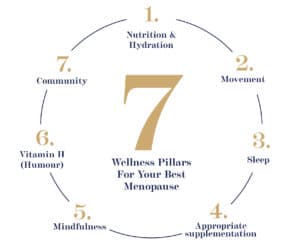Just lately we’ve been obsessing over Shakshuka, poached eggs nestled in spicy tomato sauce that’s oh-so-delicious.
Pronounced Shak-shoo-ka, Shakshuka is said to have originated in Tunisia, North Africa, which is bordered by the Mediterranean Sea. And as a Mediterranean-style diet is often touted as the best choice during menopause – hence why we’re big fans! – Shakshuka ticks off that box.
It also celebrates the ‘eat a rainbow of colour’ wisdom we favour. Indeed, you may think Shakshuka looks a tad non-picturesque but trust us, it’ll become your new go-to.
3 Reasons You’ll Love Shakshuka
1. Quick and easy-peasy
Seriously, you can whip Shakshuka up in 20-30 minutes max and it doesn’t matter how basic a cook you are.
2. It packs a protein punch
If you’ve been here for a while, you’ll know that protein is vital for women in midlife. Among other biological changes, we lose a lot of muscle mass and bone strength/flexibility in peri and post-menopause and protein helps to support this.
Exercise physiologist and nutrition scientist Dr Stacy Sims recommends approximately 1.8 to 2 grams per kilo of body weight per day.
Furthermore, protein also keeps you fuller for longer and helps blood sugar remain stable which aids weight management.
Related: How Food Can Help You Have Your Best Menopause | Meet PPFF
3. Did we mention Shakshuka’s yummy?
Not only will it keep you nice and sated it’s also a taste sensation. Think gently poached eggs and tomatoes, onions, capsicum and fresh parsley.
The Recipe: Shakshuka
Serves 2

- 1-2 capsicums, sliced
- 1 onion, sliced
- 2 x 400g cans chopped tomatoes
- 4 eggs
- ¼ cup fresh parsley, chopped
- 1 tbsp extra virgin olive oil
- salt & pepper
What you need to do:
- Heat the oil in a large non-stick frying pan over a medium-high heat.
- Add the onion and capsicum, stirring constantly.
- Cook for 5 minutes or until the onion and capsicum have softened.
- Add the tomatoes and cook, stirring for a further 5 minutes.
- Use a spoon to make 4 large holes in the tomato mixture, then crack an egg into each hole.
- Reduce the heat to low, and partially cover the pan with a lid.
- Cook for 10 minutes or until eggs are cooked to your liking.
- Sprinkle with parsley and serve immediately.
Bon appetit!
If you make this recipe we’d love it if you shared your photographs with us. And tag us on Instagram or Facebook.


Photos by Nataliya Vaitkevich @pexels











